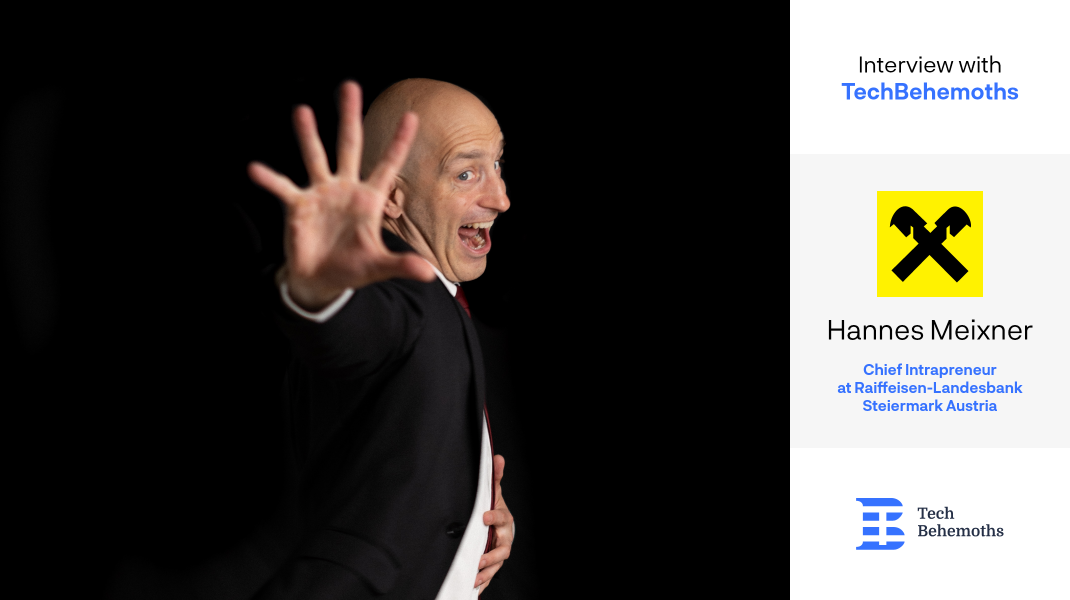Interview with Hannes Meixner - Chief Intrapreneur at Raiffeisen-Landesbank Steiermark Austria

A new week and a new interview with someone that connects traditional banking with non-traditional innovation. An enabler from an old industry that changes the stereotypes by helping startups turn ground-breaking ideas into successful businesses. Taking venture building beyond banking. Please meet Hannes Meixner - Chief Intrapreneur at Raiffeisen-Landesbank Steiermark Austria.
Hello Hannes and thank you for accepting our interview. Besides your 20 years of banking engagement, you are one of those people that is driving the IT sector in Austria and regionally. Let's have an open talk that our readers will find insightful and hopefully useful for their day-to-day activities.
I asked Bing’s AI chat who is Hannes Meixner and it said Chief Intrapreneur aka ZukunftsBauer of Raiffeisen-Landesbank Steiermark AG. What does AI not know about you? What is your background?
That’s a brilliant question and hard to answer as I do not know, what the AI really knows and just does not tell😉. But other than being married with three daughters, I swim and dance through life mostly using a motorcycle travelling to all sort of weird places. My background is music. Electronic music. It is always on.
What is ZukunftsBauer? What is the main goal of this role? What distinguishes companies that have a ZukunftsBauer from those that don't?
ZukunftsBauer literally means Builder of the future or Farmer of the Future. A true farmer will regeneratively grow the basis for our future. Appreciating both, rain and sun. The word play is also a reference to people making fun of Raiffeisen as the farmers’ bank. And if you think about it, this is actually a compliment. Being a true farmer, sustainably growing new things, to me is something very positive.

“Banking & Finance with a smile :-)” I like this short bio of you. From a banker to initiator and founder of an accelerator program. What motivated you to pursue it?
Founder in this context is a big word. There is always many people involved in setting something up like this. Where our motivation to do this was to contribute to the innovation ecosystem in Styria and play our part in making it a bit more international. We believe, that increased international exchange will lead to a better working ecosystem. And the biggest challenge is making it even bigger and finding additional motivated partners to do so.
To what extent is Raiffeisen-Landesbank Steiermark involved in the program?
Employees of the bank have the possibility to use the office space in the accelerator, so we are hoping for increased co-innovation resulting from that. Furthermore, the bank provides networking contacts, where it makes sense. And finally acts as an investor.
Is the accelerator focused on some specific industries, markets and topics?
We have five search fields (FinTech, New Work, Sustainability, Big Data and AI & Blockchain applications) that we think might be interesting to look at from a co-innovation perspective. Where really, we are more interested in impact and just hope to find really motivated people, whom we can support in following their dreams and convictions.
Could you name some successful or high-impact startups that graduated from the accelerator?
We had a lot of super interesting initiatives and unfortunately, it will still take a couple of more weeks till we see the first unicorn 😉. Stay curious
. 
Maurizio Raffone, the CFO of Credify, in his financial class, mentioned that “valuation is more art than science”. What do you think about that?
I think the statement is totally correct, not just regarding startups. Value is hardly ever something objective. Value is determined when supply meets demand. It is a compromise. To really predict where this compromise will happen, especially when much of your valuation science is based on future predictions, is really more of an art than anything else.
In the last few years, startup valuation changed compared to the 2010s. How do you (or they) value a startup now?
Unfortunately, I am not super qualified to answer this question as I have not been around that long in the startup industry. What I can contribute to answering the question are my experiences in capital market valuations and especially regarding multiples it is interesting to observe how they change over time, sometimes over days. And at the end of the day – like with any other (capital) market transaction – timing is key.
Inevitably we will compare the EU scene with the US. What is missing in the European startup ecosystem to become as impactful, rapid in growth and popular as the American?
Well for once, the markets are different. Covering the whole European market is a different animal to covering the American market. Ceteris paribus growth will be faster in the US. And my hypothesis is, that Europe on average is far more risk-averse than the US, especially regarding a possible bankruptcy. This aligns with harsher consequences when bankruptcy happens and fewer possible returns due to higher taxes. So, I would think it is partly a cultural bias, that leads to a regulatory framework that is a little less attractive for possible entrepreneurs in Europe.
As the clouds are now getting darker in the global economy, is this affecting investors’ risk appetite?
I would think, that investing in startups is influenced mostly by two factors: the general risk on or off atmosphere and (real) interest rates. Startup investments are naturally amongst the riskiest assets, hence if there is a risk off sentiment, startup investments will be hit over proportionally. And on the other hand, the lower the interest rates the more institutional investors are forced to look at riskier asset categories. Usually, these two factors are inversely related, currently they are not. Which is bad news for startups.

ICO, NFT, Blockchain and Metaverse – are some of the multiple tech trends that are either slowly fading away or being abandoned. And now long live the AI. Do you think AI will become the new normal in everyone’s life and business?
There is something I refer to as my individual reverse mom test. The test makes me answer with a yes, because the other day my 77-year-old mum monologued me about the ethical consequences of AI and still felt it was useful to have. The other mentioned technological advances did not manage to lead to such detailed speeches (my mum knows about blockchain but is not convinced it is useful. As for the rest, it is blissfully ignored) and hence I think the impact of AI might be bigger.
Hannes, enough about business. What is the best advice you got in your professional career? What about the best one from your parents?
The best advice in my professional career was actually not some advice, but more of a directive. A former CEO said to me: I need you to go out there and break rules. I still think that is beautiful advice. And regarding my parents, I think it might have been: do not get a motorbike. The advice of the former CEO won on that one.
If given the chance, which personality, dead or alive, would you have dinner with?
Anybody who comes dancing afterwards 😊, because it is just way too much fun.
If you would meet Elon Musk next week, what would you ask, tell or talk with him?
Who did your hair transplant? Grateful for a recommendation
Your favourite movie and music band? I know you are a music fan!
The choice of a movie is fairly easy: Oldboy, that won Cannes in the only year Tarantino was head of the jury. Regarding music, not so easy. Usually something connected to a concert I went to. So last weekend there was an awesome DJ session by INSOLATE. And one of the most intense concerts I have been to was by Atari Teenage Riot – a complete sensory overload.

And to conclude, could you please send a message and advice to our readers?
Be critical, especially regarding advice from a banker.
Hannes, such a pleasant talk, we can definitely continue these topics for hours, but as everything good has to come to an end, so does our today's interview. The good news is that we can always return to it and revamp the new challenges and achievements in the meantime.
On this note, I want to thank you again for our interview and wish you the best of luck and inspiration in 2023, and not only!
We hope you enjoyed our today's interview with Hannes Meixner. You can reach out to him at any time on LinkedIn.